By Bedatri D. Choudhury and Tom White
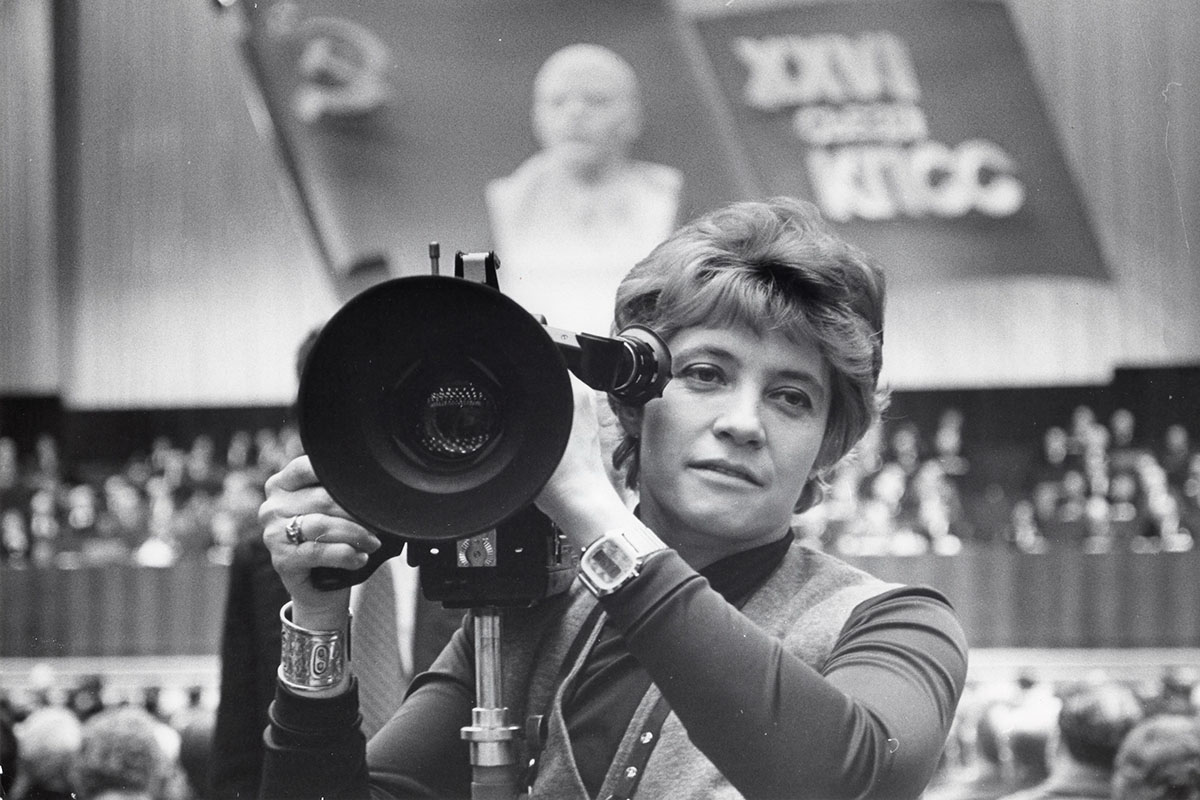
We at IDA have felt a devastating string of losses in the documentary community over the past few weeks: Michelle Materre, Brent Renaud and now, Marina Goldovskaya. Each loss, however, has afforded us a chance to reflect, with gratitude, on the great gifts that these individuals have left us and honor their art, their wisdom and their grace.
Marina Goldovskaya, who passed away in her native Russia on March 20, came from a rich artistic legacy and honed her artistry at the legendary Moscow Film School, where her father taught and was friends with such legends as Sergei Eisenstein. As an educator, Goldovskaya was a tireless advocate for her students—chiefly at UCLA School of Film and Television, where she chaired the documentary department for nearly two decades and, among her many achievements, launched a documentary filmmaker-in-residence program, inviting the likes of Albert Maysles, DA Pennebaker, Chris Hegedus, and many others to screen their films and work closely with students.
Closer to home, Goldovskaya served on the IDA Board for six years, and in 2008 was honored with the IDA Preservation and Scholarship Award.
We reached out to filmmakers, educators, former IDA Board Members and former students to share what Goldovskaya meant to them as a mentor, an artist and a friend.
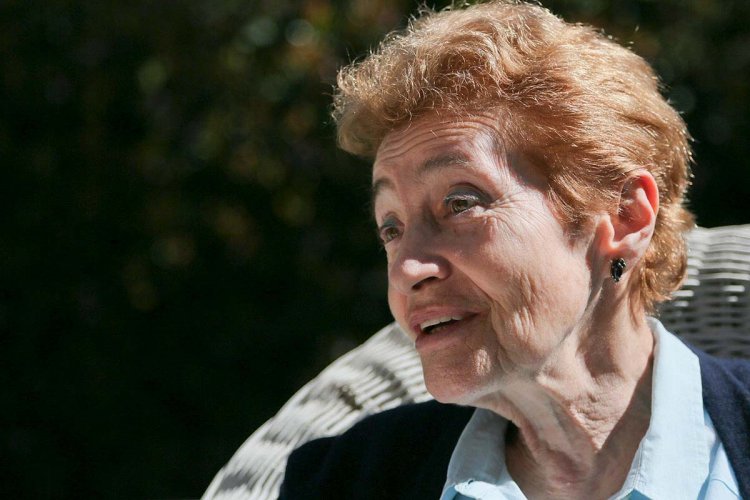
Whether dealing with light or deadly serious themes, Marina and her art always came from a place of love and joy. She shared her passion with her audiences, students and friends; it was never about self-promotion or “success” in the conventional sense.
Marina and her husband, George Herzfeld, were a team. George was deeply supportive in every way and made her later works possible, always from the background. I helped her prepare for her return to Russia in 2014, when she was compromised by Parkinson’s but still intent on getting a new small camera to take with her. She never lost that joy. How else could she have made nearly a hundred films?
Alan Barker
Cinematographer; Filmmaker
Marina was my mentor, and my inspiration. When I arrived in the US, in 2000, yearning to make documentaries, she took me under her wing at UCLA’s documentary program. She pushed me hard to grow and figure out our films. She gave me such tough notes on my first short film that I spent the next three days and nights locked in the edit room re-working it entirely. I wanted her to be proud and when I finally emerged, she exclaimed, “What a little jewel!” For hundreds or thousands of young filmmakers, Marina pointed the way.
I was awed by her contagious passion and enthusiasm. She made us love documentary. She was always in her office talking to students, giving feedback, chatting about this or that… She was a generous being. Documentary filmmaking was her life. She despised artifice and cherished the essence of documentary, its soul. After UCLA, she became a constant presence in my life. She spent so much time giving me and my husband, Robert, feedback on our films. We got to know her husband and partner, George (whom we admired), and I even got to film their granddaughter's bat mitzvah!
Last time I saw Marina in person was in 2011, in New York, where she was attending IFP Week. As she played with our one-year-old daughter, our conversations wandered through our films in progress to grants and prizes… "Beware of awards," she cautioned. “Always stay true to the soul.” ...We will, always, Marina. We love and miss your beautiful soul. Thank you for all you gave us. Farewell, dear one.
Almudena Carracedo
Filmmaker; Activist
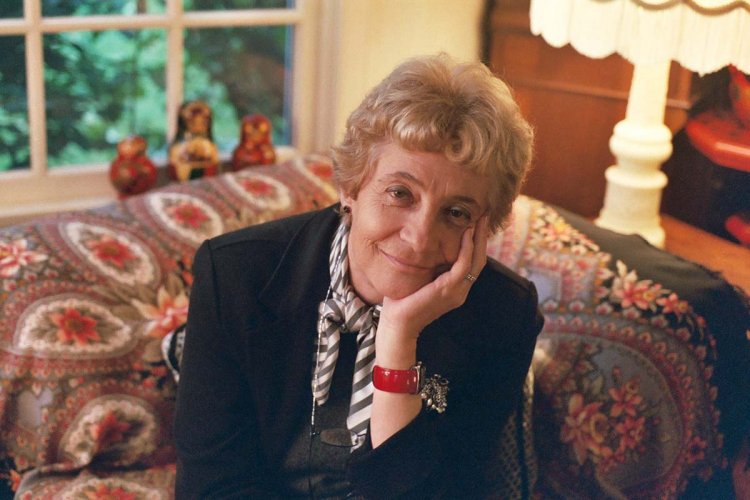
In thinking about what to write about Marina, I turned to the times I had filmed her and also to her great book, Woman with a Movie Camera. I can’t improve on Marina Goldovskaya, so in her own words, I remember her:
“What is great in this profession, there are so many human relations involved. To make any film is to be in absolute communication and love with your character.”
“When I first begin thinking about a film, when the concept is taking form, it resounds in me. I can’t say that I hear actual music—I’m not a musician—but I hear the film, and I can sense what it should be. I hear the “music” of the film before I see any specific shots. The film is already alive and playing inside me. It’s not a rational cognitive process; it’s intuitive sensation.”
“Thank goodness that documentary film and I found each other….The camera is an indivisible part of me now. If I am ever in a place where I think something interesting might happen and I don’t have my camera, I lose interest. The camera emancipated me. With it I feel free and absolutely happy.”
“Work on a movie gives rise to so many unexpected events and turns, all kinds of circumstances demanding enormous spiritual energy; it is simultaneously so exhausting and so attractive, that I don’t know of anything else that brings such joy. I have become addicted.”
Joan Churchill
Filmmaker; Cinematographer
Marina, Marina, Marina. What do you say about Marina? She was an outstanding filmmaker who will be missed enormously by those who knew her work. She was also a skilled professor at UCLA.
It is her role as a molder of future documentary filmmakers where her loss is most significant. Her films will live on. So will the students she taught, and many of them will go on to make outstanding documentaries. She brought up several generations of students—always blending in the ethics of creating a documentary film and the laws that impacted documentary filmmakers. Her passion for perfection shined through every aspect of her instructional life. I was honored to lecture during one of her sessions for one or two hours every semester until she retired. I would often arrive early or stay late just to enjoy the way she presented everything in a gentle, clear and convincing way. I learned from her style as the students absorbed her substance.
The truly amazing thing about her was her genuine humility. She never bragged, never delivered a message laced with self-importance, never forgot to give credit to others. If everyone emulated her way of interacting with other people, the world would be a better place.
So to Marina, all we can say is, Goodbye, You are missed. You made one heck of a difference. Your work will go on for years in the productions of hundreds of students who have sat at your knee. Thank you.
Michael Donaldson
Entertainment Attorney; Independent Film Advocate; IDA Board President, 2001-2003
Marina was an amazing artist, a candid witness of the times she lived in, a very close friend and a colleague who was a pleasure and inspiration to work with—both as a filmmaker and as an educator. One rarely has a chance to encounter the combination of determination and kindness, rigorousness and caring in the same person, at the same time. Marina was all that and more. Warm attention, camaraderie—we shared problems and solutions alike. When I say I miss her, that doesn’t describe the void she left behind.
Gyula Gazdag
Filmmaker
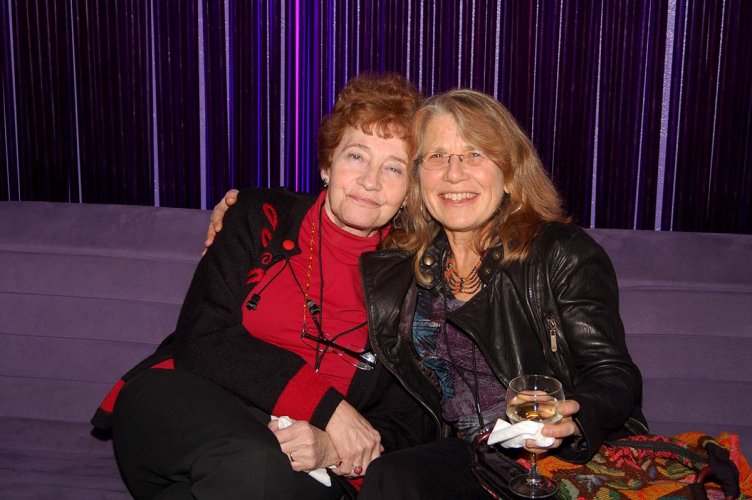
IDA Board members Marina Goldovskaya and Lyn Goldfarb in a 2011 IDA Board Mixer.
I first met Marina in 1988 in Moscow, at one of the first screenings of her documentary Vlast Solovetskaya (Solovki Power). I was in the Soviet Union with my then-husband, Anatoli Ilyashov, a Fulbright Scholar. The film was a revelation, an exposé of Stalin’s prison labor camps on Solovki Island, a predecessor of the infamous Gulags. I spoke with Marina after the screening and as documentary filmmakers, we immediately hit it off and became close friends. I was in Moscow throughout that spring, and we met often. Not even a year later, I was hired by Roland Joffe to make a documentary about transformation of the Soviet Union during glasnost and perestroika, and I returned to Moscow.
We hired Marina to direct the documentary A Taste of Freedom, which we filmed from December 1989 to March 1990. I was six months pregnant with my son Rene and Marina reassured me that she could find me good healthcare in the Soviet Union if I needed it and besides, her sister was a doctor. I felt assured that everything would be OK. I gave birth in LA in April, and she came out here to edit the film. It was a remarkable and sometimes challenging experience to work with her collaboratively on a film, but it is such a precious memory. She was an auteur with a singular vision, and I so admired her and her work.
Marina later moved to LA, married George, and we saw each other often and relished in the wonderful brunches they hosted. Marina and I also served together on the IDA Board of Directors, and I often guest-lectured at her classes at UCLA. Throughout the years of our friendship, we kept coming up with film projects to do together, but unfortunately none of them materialized. She kept making films and I remained one of her greatest fans. I saw her a few days before she left LA to return to Russia. Her health was not good and she felt she would get better care in Russia, strengthened by the support and comfort of her family and friends. The last time I heard from her was in March 2015. She was so optimistic; teaching and working on a new film. I wrote back but never heard from her again. Marina was truly an important part of my life. I miss her so much, and I am fortunate to have such strong memories. I am so grateful for the 17 years that we were friends and colleagues. My love and respect for her will be forever.
Lyn Goldfarb
Filmmaker; Former IDA Board Member
Dear Marina,
I am a longtime, enthusiastic admirer of your talent. You are an amazing girl, you are extraordinary! I hug you with all my heart.
Keep making us all happy.
Always yours, Otar
Otar Iosseliani
Filmmaker
Marina’s presence always made me smile. To me, she was like an adored cat.
She traveled—subtly and bravely—between lives and cultures, never revealing what that repeated voyage must have cost her emotionally. That was the essence of who she was. "Self-effacing” is not quite the right word.
I was awestruck, when one sunny day in a Beverly Hills screening room, she and her beloved husband, “Georgie,” presented a collection of her work—both prolific and profound. Her unique bi-cultural perspective will be treasured.
Late in 2015, I was in Russia and I telephoned Marina’s son, hoping to make contact. He suggested it would be best for me to remember Marina as she was…
And I do.
Lynne Littman
Filmmaker; Former IDA Board Member
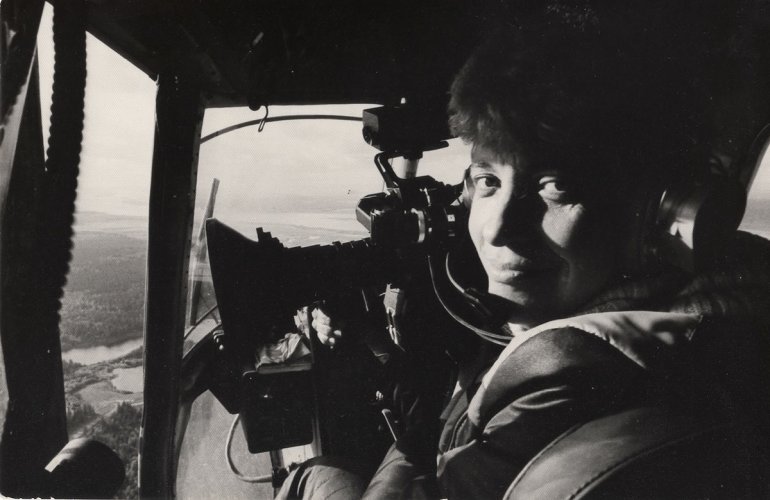
In Russian, when a beloved person dies, we say Вечная память / Vechnaya pamyat, which means “Eternal Memory” for the departed.
I first met Marina Goldovskaya at the Middlebury College School of Russian, where I was director of the School of Russian and she was an invited artist in residence. During her time with us in Vermont, we showed several of her films and she talked with the students—all of whom were studying Russian and had varying degrees of fluency in the language—about the questions of history, politics, and philosophy she raised in her films. In her interactions with them, Marina demonstrated extraordinary patience (their linguistic skills were not always adequate to the sophistication of the questions they wanted to ask), without any condescension.
Later, as a professor at the University of Wisconsin-Madison, I invited her to come to talk about her film Solovky Power to students, faculty, and guests from the greater Madison community— this time, a conversation in English.
In both contexts, Marina’s profoundly deep understanding of the impact of history on the individual (remember the scene when the camera crew discovers letters written by the prisoners, letters never sent), together with her personal warmth and caring, made a deep impression on all those in attendance. We remained friends and I visited her in Los Angeles and she visited me and my family on the East Coast. As I think back about all my interactions with Marina, both in formal and informal contexts, I hear her voice not only in our conversations, but in her masterpieces of documentary film. In her works, she consistently demonstrated the importance of compassion and the consequences for society when that compassion disappears. We certainly have seen the consequences of the lack of compassion in the United States and around the world, especially in recent years and currently. In her film The Children of Ivan Kuzmich, Marina honored a man who protected the daughter of a man designated by Stalin as an enemy of the people, at tremendous personal risk. She also showcased the possibility of the difference one person can make in the world. Marina was one person who made a world of difference. She leaves behind extraordinary films that will always keep her in our eternal memory.
Benjamin Rifkin
Professor of Russian, Hofstra University
I was incredibly sad to hear of Marina Goldovskaya’s passing. She was a shining beacon and in the darkest of times that we live in right now, her light and her talent would’ve been ever so important. I feel that the depth of depravity and aggression that Russia has descended into is partly due to lack of people like Marina.
Her films influenced me deeply. The characters whose life she chose to illuminate in her films were people of culture and people with incredible sense of beauty. Her films told me and told the audience about new opportunities, about possible new life trajectories. She showed professions that were previously never a focus of documentaries. She showed us life and she showed us the world. In many ways Marina motivated me, helped me formulate my true core values and endlessly inspired me, and will continue to inspire even after her death.
Alexander Rodnyansky
Filmmaker
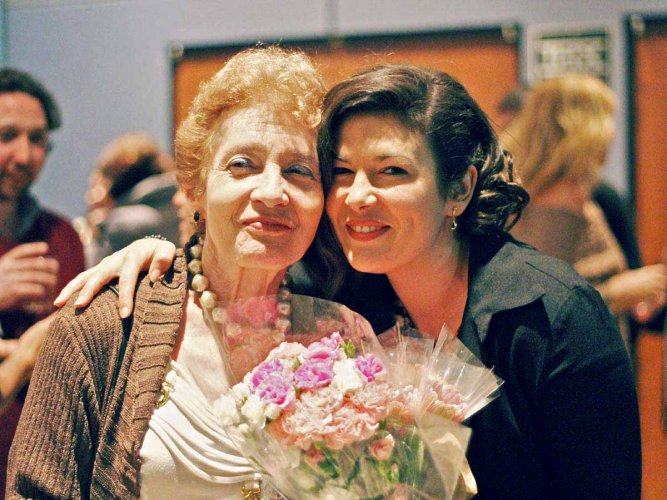
Marina’s warmth lifted us. When life weighed down on us, she lifted us. She had a passion for life; for her, life was documentary, documentary was life. She was convinced if we bought wine and cheese, people would come to the Documentary Salons she organized at UCLA. And they did. But it wasn’t for the wine and cheese; it was for their soul to be lifted around her.
Marina had a community of documentary legends she had become friends with—Pennebaker, Maysles, Richard Leacock, Joan Churchill, Alan Barker—which she generously shared with her students, and made sure we would become part of it. She worked hard and made us work hard, but the way she inspired us to look at life through the camera lens, we will never forget. As I now look at her through her camera lens, I see her passion lifting us from beyond. She always had a camera. Even in class, she would film the documentary lumineers and our class discussions with them, and then share these documentary pearls of wisdom with others. She was always making a film about life or always filming life, knowing it would eventually become part of one of her films. How we miss seeing life through your lens, Marina. You are dearly missed. I will treasure our friendship forever and I am so glad I filmed it to remember how warm life can be. Love you Marina, Darlingka…
Esther Shubinski
Filmmaker; UCLA School of Film, Theater & Television Alumna
It was with great sadness that I read of the passing of Marina Goldovskaya. I got to know Marina well when we served together on the IDA Board during the late ‘90s and early 2000s. Her gentle smile belied the fierce and brave documentary filmmaker that she was. Her courage, as a Jewish woman, to make the films she did about life in the Soviet Union is a model to all of us who make documentaries. I was particularly moved by the dedication to her students whom she both inspired and mentored over the years. I had the great honor to be invited by her to speak to some of those classes. I recall with great affection the time I also got to spend with Marina and her beloved George, who was her greatest booster and supporter. I missed her when she moved back to Russia, and I will always remember her kindness. May her memory always be a blessing.
Rick Trank
Filmmaker; Former IDA Board Member
When I approached Marina about hiring UCLA film students to spend a year filming the senior class at Fairfax High School during the 1999-2000 school year, she didn’t hesitate for a minute. I didn’t know her, and she didn’t know me, but from that moment on, she was as friendly, open, and giving as anyone I had ever met. For me, it’s the people I connect with while on this tortuous documentary filmmaking journey that make it all worthwhile, and Marina is on the top of that list. What a gem. I’ll always love you, Marina.
David Zeiger
Filmmaker
In 2012, some of Marina Goldovskaya’s teaching assistants at UCLA wrote farewell letters to her on her retirement. We are so thankful to Esther Shubinski for sharing these with us.
[[nid:11507]]




